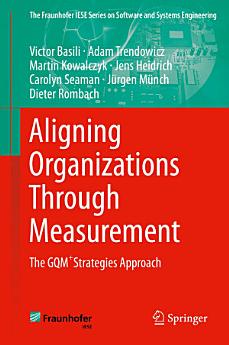Aligning Organizations Through Measurement: The GQM+Strategies Approach
À propos de cet e-book
This book provides guidance on how to achieve this alignment, how to monitor the success of goals and strategies and use measurement to recognize potential failures, and how to close alignment gaps. It uses the GQM+Strategies approach, which provides concepts and actionable steps for creating the link between goals and strategies across an organization and allows for measurement-based decision-making.
After outlining the general motivation for organizational alignment through measurement, the GQM+Strategies approach is described concisely, with a focus on the basic model that is created and the process for creating and using this model. The recommended steps of all six phases of the process are then described in detail with the help of a comprehensive application example. Finally, the industrial challenges addressed by the method and cases of its application in industry are presented, and the relations to other approaches, such as Balanced Scorecard, are described. The book concludes with supplementary material, such as checklists and guidelines, to support the application of the method.
This book is aimed at organization leaders, managers, decision makers, and other professionals interested in aligning their organization’s goals and strategies and establishing an efficient strategic measurement program. It is also interesting for academic researchers looking for mechanisms to integrate their research results into organizational environments.
À propos de l'auteur
Victor Basili is Professor Emeritus of Computer Science at the University of Maryland. He has worked on measuring, evaluating, and improving the software development process and product by applying methods such as Iterative Enhancement (IE), the Goal Question Metric Approach (GQM), the Quality Improvement Paradigm (QIP), and the Experience Factory (EF). He is the recipient of several awards including the NASA Group Achievement Award (1996), ACM SIGSOFT Outstanding Research Award (2000), and the IEEE Computer Society Harlan Mills Award (2003); and he is an IEEE and ACM Fellow.
Adam Trendowicz is a senior consultant at the Fraunhofer Institute for Experimental Software Engineering IESE (Process Management Division) in Kaiserslautern, Germany, where he leads the “Measurement and Prediction” team. He has led multiple measurement-based software improvement activities in software companies of different sizes and various domains worldwide. He has been involved in functional software size estimation and productivity benchmarking in organizations from both industry and the public sector. Last but not least, he has led the development of measurement-based project governance initiatives in the context of software development organizations.
Martin Kowalczyk is a researcher at Technische Universität Darmstadt, Germany. His current research focuses on Business Intelligence and Analytics in the context of organizational decision making processes. Prior to his current position, Martin was a researcher and consultant at Fraunhofer IESE and member of the Processes Management Division. In this position, he provided consulting services for several international organizations from the aerospace, finance, and services industries regarding software process improvement and measurement.
Jens Heidrich is head of the Process Management Division at the Fraunhofer Institute for Experimental Software Engineering IESE and a lecturer at the University of Kaiserslautern, Germany. His research interests are in the areas of software project control, cost estimation, software quality modeling, quality assessment, and measurement of software engineering products and processes.
Carolyn Seaman is an associate professor of information systems at the University of Maryland Baltimore County (UMBC). Her research generally falls under the umbrella of empirical studies of software engineering, with particular emphases on maintenance, organizational structure, communication, measurement, COTS-based development, and qualitative research methods. Prior to this position, she worked in the software industry as a software engineer and consultant, and has conducted most of her research in industrial and governmental settings (e.g., IBM, NASA, Xerox).
Jürgen Münch is a professor in the Department of Computer Science at the University of Helsinki, Finland, and heads its Software Systems Research Group. His research focuses on software measurement and quantitative analysis, process and quality engineering, global software development, and empirical software engineering. Jürgen has been a principal investigator in numerous research and industrial development projects. He was awarded the Distinguished Professor Award FiDiPro of Tekes, and the IFIP TC2 Manfred Paul Award for Excellence in Software Theory and Practice.
H. Dieter Rombach has held the Software Engineering Chair in the Department of Computer Science at the University of Kaiserslautern, Germany, since 1992. In addition, he is the founding and Executive Director of the Fraunhofer Institute for Experimental Software Engineering IESE in Kaiserslautern, Germany. Among the many awards he has received are the “Presidential Young Investigator Award” of the National Science Foundation (NSF) in the U.S. (1990) and the Federal Cross of Merit on Ribbon of the Federal Republic of Germany (2009). He is a Fellow of both the ACM and the IEEE Computer Society.




